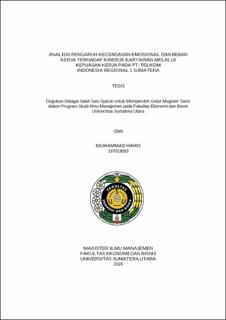| dc.description.abstract | This study is motivated by the phenomenon of company transformation towards a leaner structure, where employees are required to be more agile in adapting to higher workloads and tighter deadlines. Additionally, the suboptimal job satisfaction among employees has resulted in decreased performance. The objective of this research is to examine and analyze the influence of emotional intelligence, workload, and job satisfaction on employee performance. This research employs a descriptive quantitative approach. The population for this study consists of 105 employees, with a total sample of 105 employees selected using a saturated sampling technique. Data collection methods include questionnaires, interviews, and documentation studies. Data analysis methods involve descriptive statistical analysis and SEM-PLS 4. The findings of this study indicate that emotional intelligence has a positive and significant effect on job satisfaction. Workload also has a positive and significant effect on job satisfaction. Emotional intelligence has a positive and significant impact on employee performance, while workload has a negative and insignificant impact on employee performance. Indirectly, emotional intelligence positively and significantly influences employee performance through job satisfaction, and workload positively and significantly affects employee performance through job satisfaction. | en_US |


